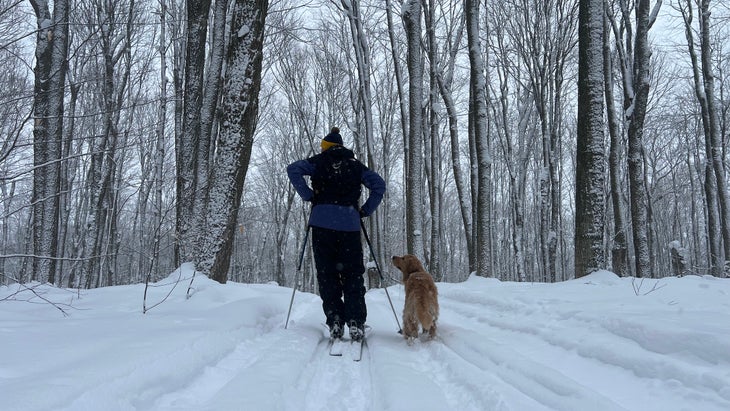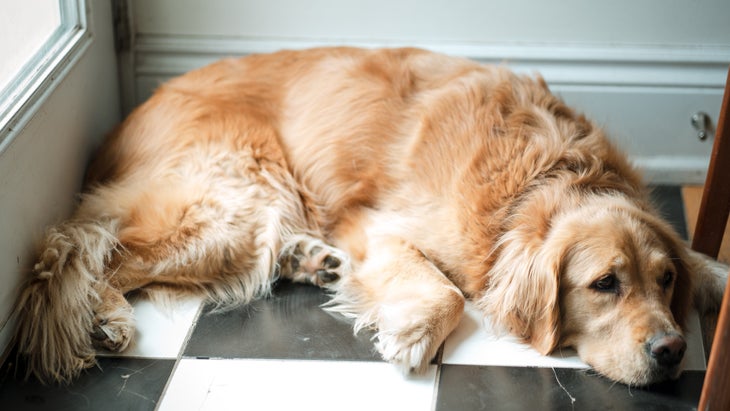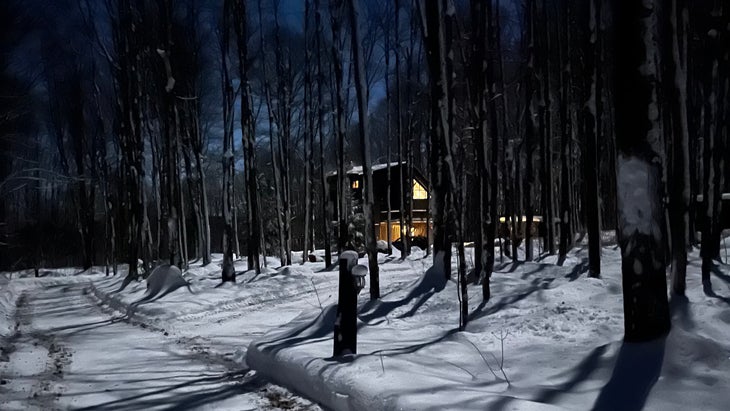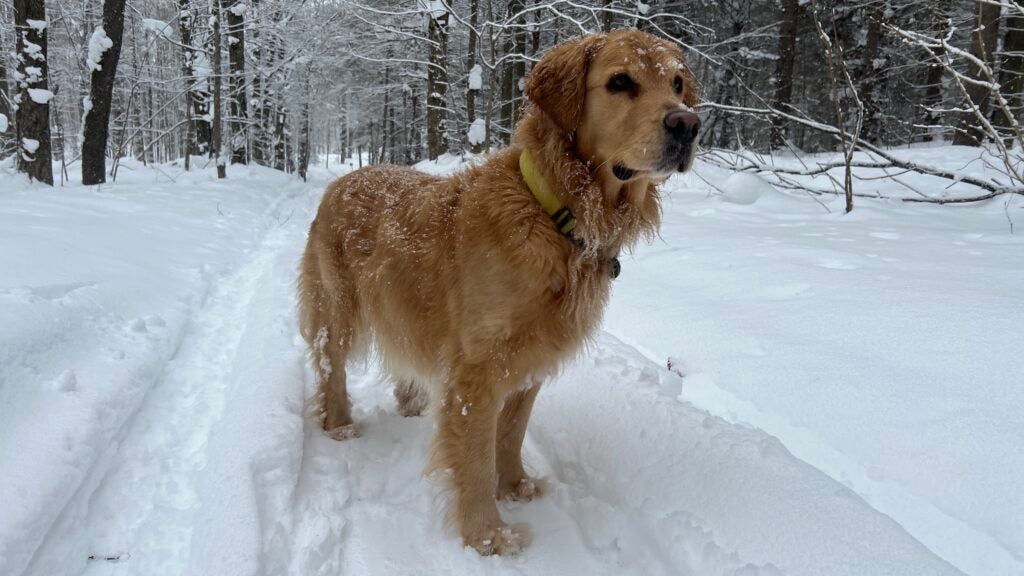My husband, Dave, went skiing down a forested slope behind our cabin near Collingwood, Ontario. It was a rare perfect day when he set out with our dog, Phoebe. The deep powder lured them both.
Phoebe loves to ski. She’s a golden retriever, and a homebody, with traits bred into her for domestic life. Her namesake is a character in Friends, and it suits her. On the slopes, she lunges through the powder on the tails of Dave’s skis. When they reach the end, she turns and runs home.
Got a Survival Tale?
If you’ve found yourself in a high-stakes scenario outdoors, Outside wants to hear from you. Please send some basic details about your experience to “survivalstories @outsideinc.com” with the subject line “SURVIVAL STORY.”
That perfect day, Dave and Phoebe took three turns. On the fourth, the edge of Dave’s ski hit a downed log. The impact catapulted him forward. With the trunk of a maple tree coming fast towards him, he remembers thinking, I better move my head.
After that, everything went black.

I could tell this story another way: it could be about all the trees Dave hasn’t hit.
The first time we met, I watched him kick-turn down the face of Mount Washington in Oregon. Over the years he’s wound through the trees of the Central Cascades. We’ve skied on glaciers, volcanos, and through glades, and he’s come away unscathed. But trouble found Dave the day he went skiing out our back door.
When Dave became conscious, he was about 350 feet down the slope from our cabin. He thought that something was caught by his neck. When he reached to push it out of the way, he realized it was his collarbone.
Though Dave didn’t know it at the time, he had slammed chest-first into the tree. While his head was spared, he had 16 broken bones.
His skis were still attached to his boots. He tried to turn around, but he passed out, and woke up having slid further down the slope.
Phoebe, our dog, was panting, nervous, and running in circles around Dave. It was just before 4 P.M. The light was flattening; the sun would set in another 30 minutes. He had a blurry thought about his phone, but it was buried deep inside an underlayer in a back pocket. He couldn’t reach it.
It’s not ideal to do any backcountry activity on your own, but we had come to the habit when our kids were young. If you didn’t make the most of each precious spare moment you had, you would probably miss your chance.
And now Dave was fighting an urge to sit down and close his eyes. It was well below zero degrees Fahrenheit.
He managed to get his skis off. The dog leash was around his shoulder. He pulled the end to cinch his arm against his body. The leash became a sling, which took the pain from his collarbone just out of fainting territory. With ski poles in one hand, he took a step. He wobbled, almost fainted again, then glanced up the hill. Which way was the cabin?
He couldn’t see it from that position on the slope. His vision had narrowed to a channel. Direction was hazy. He could only focus on what was right in front of him.
What appeared in that narrow line of vision was Phoebe. Looking into her eyes, Dave could tell she wanted to run home, like she always does.
“Go on,” he said, thinking if Phoebe appeared at the door of the house alone, it might prompt one of us to question why. “Go home,” he said.
Can a dog be a hero? Dog-cognition researcher Alexandra Horowitz, in her “Off Leash” podcast, asks if dogs can intentionally rescue people in need. She cites a study that tested the rescue capacity of pet dogs (rather than specially trained rescue dogs). A person was put inside a box. They called out in distress. Then, their dogs were allowed to enter. According to the research, one in three dogs “rescued” their dog from the box.
Clive Wynne, the lead researcher on the study, said it’s difficult to assess a dog’s intent. Did the dog rescue the person for an altruistic reason, or did the assistance come from a place of self-interest? Wynne believes that, by finding a way to end the human’s distress, the dogs felt better, too.

Instead of running home, Phoebe turned, moved a few steps, then waited. Dave put a foot forward, a ski pole, and took one painful step. (Eight of his broken bones would turn out to be ribs.) Phoebe took another step, then waited again. Dave inched forward. He kept his eyes fixed on her hind end and slow-moving tail.
This tail became his only focus. Step by step, Phoebe moved just ahead of Dave. He lost track of time. All he remembers is being aware that they were moving uphill—and that keeping the dog’s tail in his sightline was like a lifeline. About halfway up the slope, he stopped and had trouble catching his breath. He thought something had happened to his lung. He’d later learn that it was punctured.
They kept moving together. When Phoebe’s tail finally stopped, Dave looked up and was surprised to see the house. She had led him to the front door. He called and we came running.

Later, I retraced their tracks up the hill. The paw prints didn’t take the steepest or most direct route. Phoebe led Dave in a steady line, one that he could manage. She stayed with him.
When I saw Dave in the emergency ward, he wore a neck brace. Medical officials wheeled him off to a scan, and eventually they would locate the 16 broken bones, including some along the wings of his vertebrae. The crash did no permanent damage; he was incredibly lucky. Two years later, Dave is fully healed, though a little more crooked than he used to be.
But then, in the emergency ward, a nurse had just injected him with Fentanyl. He was fairly lucid, if a little loopy when they started to wheel him away, but there was something else he wanted to say.
As I leaned closer, I realized that in Dave’s mind, it didn’t matter whether Phoebe’s intentions were altruistic or not. There was no need to ask the question. What mattered was her presence. She stayed with him and that was what gave him strength.
He whispered into my ear, “Phoebe saved my life.”








